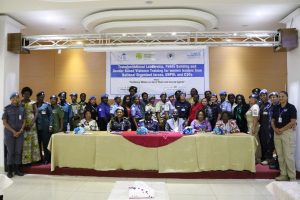 The National Transformational Leadership Institute at the University of Juba with support from the UNWomen and the Ministry of Gender, Child and Social Welfare conducted a six day training on Transformational Leadership, Sexual Gender Based Violence and Peace Building for women leaders in Juba. The training took place at Crown Hotel in Juba from 10th to 15th August 2019 and brought together 35 participants from United Nations Police (UNPOL), South Sudan National Police Service (SSNPS) and Civil Society Organizations. The opening session was attended by the Director of the NTLI, the Vice Chancellor of the University of Juba, the UNWomen Deputy Country Director, a representative from United Nations Police and officiated by the Inspector General of Police (IGP).
The National Transformational Leadership Institute at the University of Juba with support from the UNWomen and the Ministry of Gender, Child and Social Welfare conducted a six day training on Transformational Leadership, Sexual Gender Based Violence and Peace Building for women leaders in Juba. The training took place at Crown Hotel in Juba from 10th to 15th August 2019 and brought together 35 participants from United Nations Police (UNPOL), South Sudan National Police Service (SSNPS) and Civil Society Organizations. The opening session was attended by the Director of the NTLI, the Vice Chancellor of the University of Juba, the UNWomen Deputy Country Director, a representative from United Nations Police and officiated by the Inspector General of Police (IGP).
The overall objective of the training was to build skills of women leaders from UNPOL and SSNPS on Transformational Leadership, Conflict Management and Peace Building and Sexual Gender Based Violence. Participatory approaches of learning were employed which included brainstorming, interactive lectures, demonstrations, case studies, group discussions, experience sharing and role plays. The topics covered included understanding transformational leadership, envisioning a culture of peace, conflict mapping and analysis, sexual gender based violence prevention and response, conflict management strategies, non-violent means of resolving conflict with emphasis on mediation and dialogue, advocacy and lobbying, networking and information sharing, issues undercutting women’s representation in the organized forces, local and professional etiquette, trauma healing and counseling, communication and public speaking and gender provisions in the Revitalized Agreement on the Resolution of Conflict in South Sudan (R-ARCSS).
The training resulted into the following: Firstly, the participants’ knowledge was sharpened on leadership and the role it plays in addressing issues undercutting women’s representation in the organized forces. Secondly, participants’ knowledge was sharpened and deepened on gender, the causes and effects of sexual gender based violence on women, families, perpetrators and the community at large and trauma healing of gender based violence survivors. Thirdly, they were able to map out the conflicts in South Sudan identifying the causes, effects and key stakeholders in these conflicts and developed strategies on how to resolve these conflicts. Fourthly, participants were able to envision a culture of peace where people live in harmony with the ability to advocate for their human rights. Finally, participants were able to establish a network for experience and information sharing between UNPOL, SSNPS, female police officers and civil society organizations.
From the action points of the participants, UNWomen was requested to continue strengthening the capacity of women leaders from UNPOL and SSNPS on gender mainstreaming, sexual gender based violence prevention and response, trauma healing, special protection units and the specialized SGBV courts across the country on leadership, SGBV, conflict management and peace building and economic empowerment. Another key recommendation for UNWomen was to conduct joint trainings for both male and female police officers to discuss contentious issues undercutting women’s representation in the Organized Forces.
